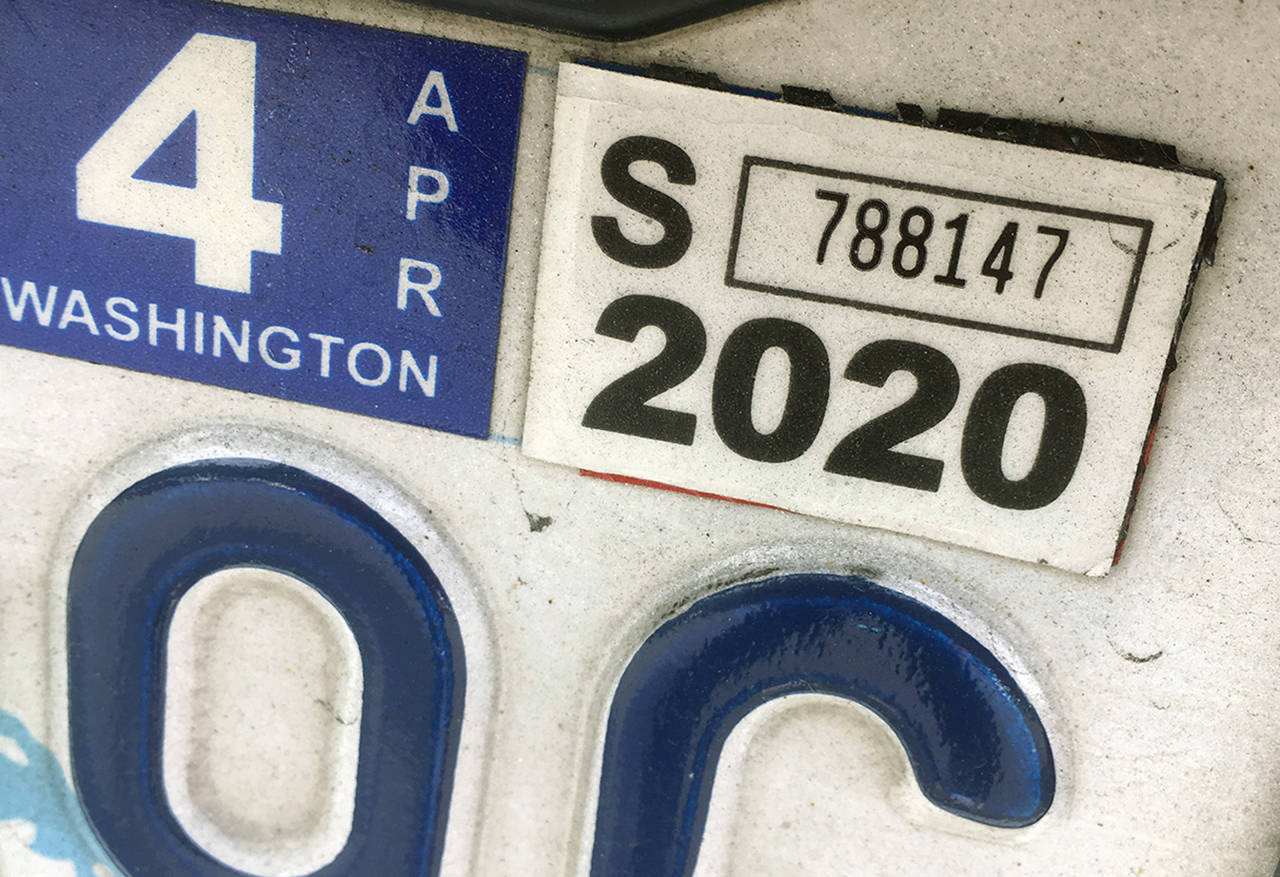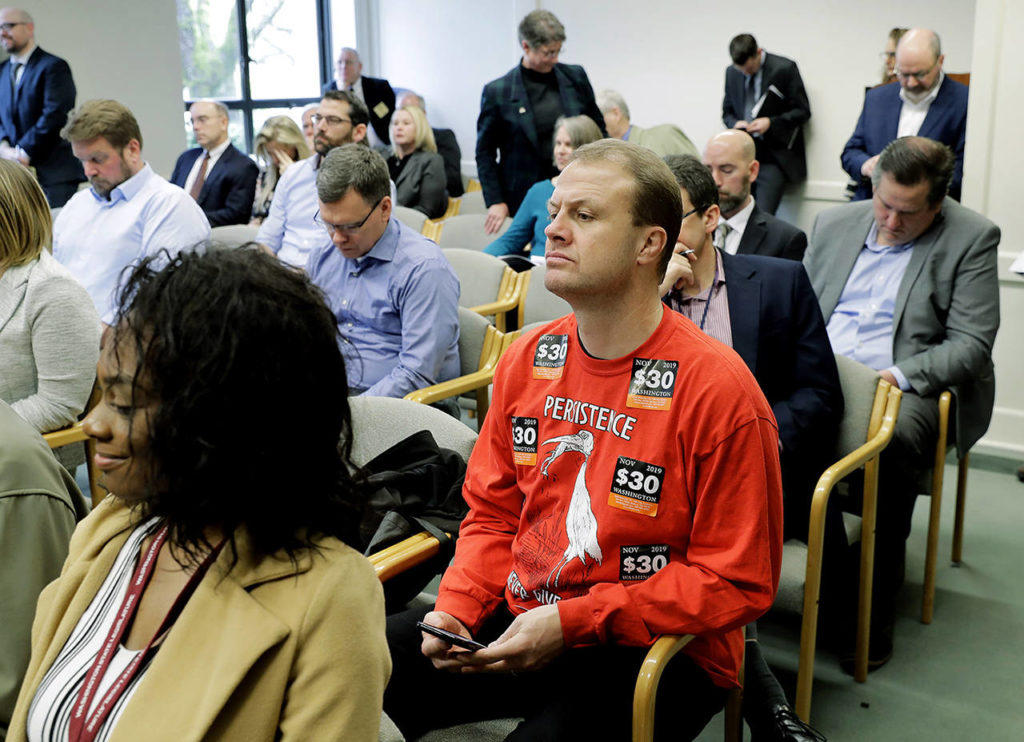OLYMPIA — The cost of those tiny car tabs will be at the center of another big ballot battle this fall.
Initiative 976, the latest handiwork of Tim Eyman, seeks to cap car tab fees at $30, erase most of the motor vehicle excise tax collected by Sound Transit, and wipe out fees now imposed by cities through transportation benefit districts.
If approved on the Nov. 5 general election ballot, and if it withstands an almost certain legal challenge, it would siphon off millions of dollars flowing into accounts used each year to buy buses, expand transit service, repave streets, maintain ferries, build roads, fix bridges and run the Washington State Patrol.
And it could force Sound Transit to delay or discard elements of its voter-approved ST3 expansion which is supposed to bring light rail service to Everett, Tacoma and Eastside cities in the next 20 years.
Collectively, the financial impact stands to be more far-reaching than Eyman’s previous car-tab targeting measures which voters embraced in 1999 and 2002.
He said blame the state, local governments and Sound Transit, for they’re the ones piling taxes and fees onto the annual registration bills.
“The reason 976 is so necessary is that taxpayers are getting ripped off, politicians know it and they refuse to do anything about it,” said Eyman, a former resident of Mukilteo now living in Bellevue. “Voters have voted twice to keep car tabs low and they’re creeping back up again to how bad they used to be,”
A new analysis projects the economic hit could reach $4.2 billion in the next six years.
It estimates the state will collect $475 million less for its current two-year transportation budget. Over six years the losses would add up to $1.9 billion, according to the fiscal impact statement prepared by the Office of Financial Management.
Local governments, meanwhile, stand to lose $58 million a year in the same period with Sound Transit collecting an estimated $328 million less a year, or $1.97 billion in six years. The full analysis will be available online and in the voter pamphlet ahead of the general election.
“It blows a huge hole in the funding of our transportation system,” said Andrew Villeneuve, founder of the Northwest Progressive Institute, and creator of a “No on Tim Eyman’s 976” website.
“If I-976 is implemented, then there will be cuts to already-approved projects and services,” he said in a recent statement. “These would be significant cuts that would be noticeable and widely felt. Cuts that increase traffic, make our tax code more unfair, and saddle us with costs we don’t need or want. For example, Everett and Tacoma could lose their planned light rail stations because it’s unlikely there would be sufficient funds to build them.”
Eyman, when asked about the large sum of lost revenue, suggested a different way of characterizing it. “Let’s say we’re providing $4 billion back to taxpayers.”
This measure takes aim at three major targets.
First, it would cap car tab fees on passenger vehicles at $30, reduce fees for electric vehicle and snowmobiles to the same level, and get rid of a special 0.3 percent sales tax imposed on sales of new vehicles. Those are all controlled by the state.
Second, it goes after Sound Transit. It seeks to eliminate much of its current 1.1 percent motor vehicle excise tax rate (MVET). If passed, only 0.2 percent of an 0.8 percent increase approved by voters in 2016 as part of Sound Transit 3 would remain in effect. ST3 is the source of funds for expanding service to Everett.
Also, it would require Sound Transit, when calculating MVET, to stop using a 1990s-era depreciation schedule which overvalues vehicles. Instead, those taxes would be based on Kelley Blue Book values. Another provision compels the regional transit authority to “fully retire, defease, or refinance” outstanding bonds getting paid off with existing car tab taxes.
Sound Transit estimates a $20 billion impact through 2041 if the measure passes, the combination of collecting $6.95 billion less in MVET revenues and shelling out $13 billion more in higher interest costs in future transactions. Officials also forecast delaying or canceling projects.
Eyman brushed off the dire prediction. It’ll be “a haircut” of incoming revenues, he said, noting the measure doesn’t touch the sales tax increase and new property tax also approved by voters in 2016.
Third, the measure would ax vehicle fees levied through transportation benefit districts, a move that would affect Edmonds, Everett, Granite Falls, Lynnwood and Mountlake Terrace. The initiative seeks to erase the authority of those districts — which exist in roughly 60 cities — to levy such fees.
In Everett, council members tacked on a $20 charge for vehicle registration in 2015. Last year, the fee brought in $1.5 million, making up about 41 percent of the city’s paving and maintenance budget.
Lynnwood would lose about $1.2 million for road projects if Eyman is successful. And in Edmonds, about a third of funding for roads would disappear.
Opponents say it’s a complex proposal and it is going to take some work to make sure voters understand what’s truly at stake in their community.
“The impacts of this misguided initiative touch every corner of the state,” said Sandeep Kaushik, consultant to Keep Washington Rolling, an alliance of diverse political forces that is leading the fight against the measure.
“It cuts state-funded projects, as well as regional and city-level projects – impacting transit service, road maintenance and major highway infrastructure projects. It also defunds projects that were already approved by local voters,” he said.
This coalition of businesses, unions, environmental groups, and transit advocacy and progressive organizations first united in 2005 to defend a statewide gas tax hike from repeal. Since then it’s persistently pushed for improving and expanding most modes of transportation. In 2015, its members embraced the Connecting Washington package which earmarked billions of dollars for road and transit projects through 2031, and enabled Sound Transit to pursue its latest expansion plan using the outdated vehicle valuation system.
One of the “biggest and long-lasting risks” is to the state transportation budget, Kaushik said.
“By cutting $4 billion in state funding in the first 10 years, it forces the Legislature to redesign the whole plan. This means that every state-funded transportation project is again at serious risk, as it’s impossible to know what projects will survive in the next plan. I-976 also cuts state funding that supports the State Patrol and direct transit services for veterans, senior citizens, children and people with disabilities.”
The coalition has been at odds with Eyman before. In 2011, it bankrolled the $2.5 million campaign that defeated his Initiative 1125 which sought to overhaul tolling rules and practices.
As of Friday, the coalition had raised $625,098 of which $300,000 came from the Microsoft Corp. Kaushik said he anticipates raising a couple of million dollars by November.
Eyman’s political committee, Permanent Offense, reported raising just under $60,000, as of Friday.
Jerry Cornfield: 360-352-8623; jcornfield@heraldnet.com. Twitter: @dospueblos.
Talk to us
> Give us your news tips.
> Send us a letter to the editor.
> More Herald contact information.


























